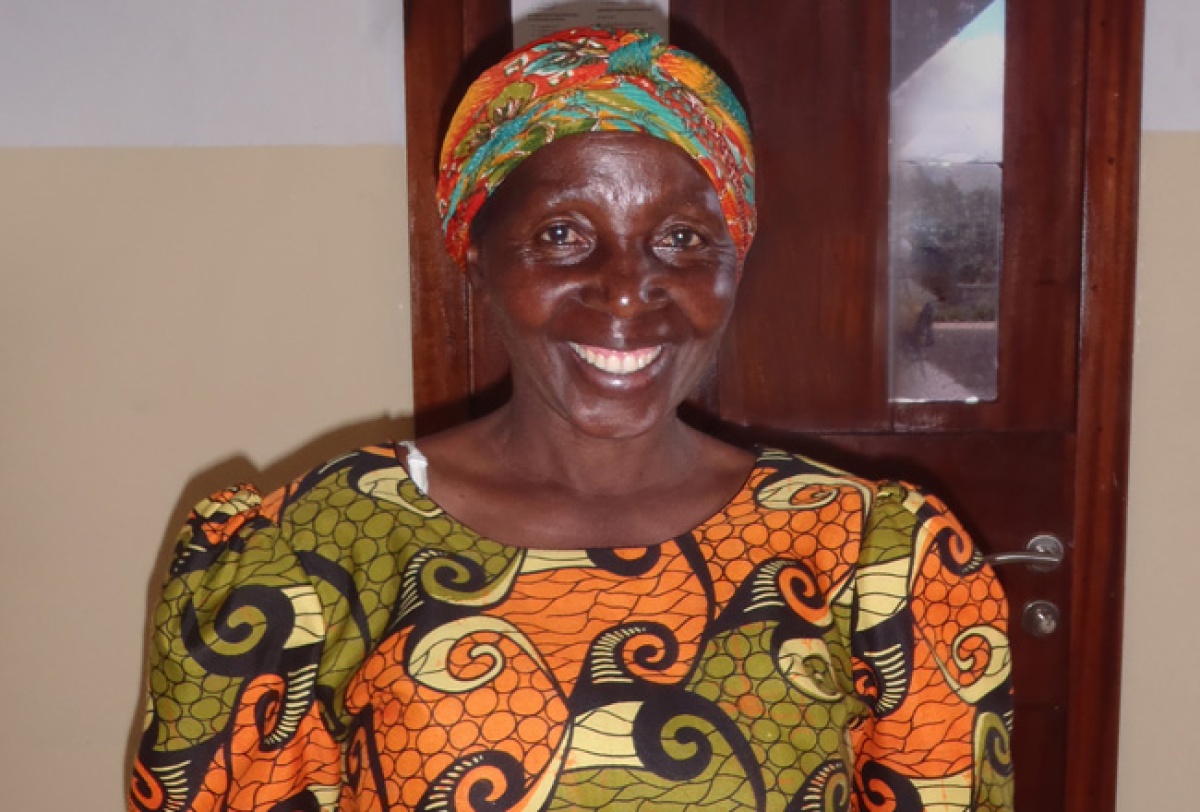Surviving Breast Cancer in Rwanda: Zerida's Story
Posted on Mar 15, 2013

Zerida Nyinaguhirwe is one of the first breast cancer patients to complete cancer treatment at Butaro Hospital, a Ministry of Health hospital in Rwanda that is supported by Partners In Health—and where the national Cancer Center of Excellence was inaugurated July 18, 2012. Her story demonstrates the importance of timely care while reminding us that cancer does not discriminate between the rich and the poor.
My name is Zerida Nyinaguhirwe. I am 53 years old, from Burera District in the northern province of Rwanda. I am a subsistence farmer and live by myself; after my husband and I learned that I was unable to conceive children, he divorced me.
One Wednesday morning while digging in my garden three months ago, a stick accidentally hit my breast. After two days, my breast had swollen. This was not normal for me, and the following week I visited a nearby health center for a checkup. Because the health center had no specialist or equipment to diagnose my problem, I was referred to Butaro Hospital. In January, a tissue sample was taken from my breast for testing, and the doctor told me to wait until they called me with my results.
In March, I had a phone call from the hospital letting me know that my results were ready. At the hospital, I was put in a beautiful room with bright lights. “Zerida, your results show that you have breast cancer and it’s treatable,” the doctor said.
I was shocked to hear this and knew it was my time to die. I asked the doctor, “What do you mean that it is treatable, yet I have never seen anyone who has survived it?”
“Many people have been treated for breast cancer and have survived. You are going to be among them,” the doctor said.
This encouraged me. Right away, I asked the doctor what the treatment would be—I was willing to receive any type of cancer treatment.
I was told that I was going to have chemotherapy and surgery to remove the breast. My initial treatment was scheduled at Rwinkwavu Hospital, another government hospital supported by PIH in the eastern province that had been treating cancer for some time. As Rwinkwavu is a five-hour drive from where I live in Burera District, I could not afford the transport costs; thankfully, they were to be covered by PIH. I had never received such complete care. I had great hope that my treatment would be successful.
In the first weeks of my treatment, I felt okay, but as I continued it became very difficult and I thought I was going to die. The drugs’ side effects turned my nails black, suppressed my appetite, caused my hair to fall out, made me feel weak all the time, and I thought I was going to lose my eyesight. My family, friends, and fellow cancer patients also thought I would die, so I pretended to them that I was strong and would get better.
In May, I was given a transfer to Butaro Hospital for the continuation of my treatment. This change was amazing for many reasons. Butaro Hospital is near my home, therefore my transport bills would be less costly to PIH and my family was given much relief. Throughout my time in Rwinkwavu Hospital, my family had always asked to accompany me, but I never allowed it because it was too expensive and I was given enough care at the hospital. But still, my family members were not comfortable with me being alone.
I stopped taking medicine in mid-June, and the doctor told me to come back on July 19 for breast surgery. During this break my hair started to grow, I got my appetite back, and my nail color normalized. My family, friends, and I were encouraged by the recovery, which positively prepared me for my surgery. Deep inside, I was wondering what I was going to look like with one breast and how I would explain this to others.
The surgery was a success. All my family members, friends, and I were happy about it and we believed that my cancer would be cured. While at Butaro Hospital, I met many other cancer patients—we encouraged each other and became like a family.
To my fellow women, breast cancer is common these days and requires prompt attention. In case of any unusual feeling in the body, you should visit the nearby health center right away. For those that also have cancer, following your treatment plan is the first step to recovery, despite difficult side effects. More so, it is important to be positive and encourage others to be aware that treatment is possible for cancer.
I am grateful for Partners In Health and the government of Rwanda, because they have made cancer care available and affordable. As a poor woman of my age, I would not have managed cancer treatment and transport costs on my own. For my entire treatment, I only paid 7,800 RWF ($12.50).
Thanks to medications and surgery, I am now treated for breast cancer and hopefully cured. I am doing well, although the doctors warned to be careful about any unusual feelings. “Cancer can always come back and to any other part, anytime” the doctor said. I now can’t carry heavy material or dig because I still feel some pain where I had surgery.
Lastly, I would like to thank the doctors and nurses at Butaro and Rwinkwavu hospitals, who took care of me tirelessly. Above all, I would like to send my sincere gratitude to His Excellency President Paul Kagame, for his good governance and for inviting Partners In Health to Rwanda, as they have taken cancer care to another level.

